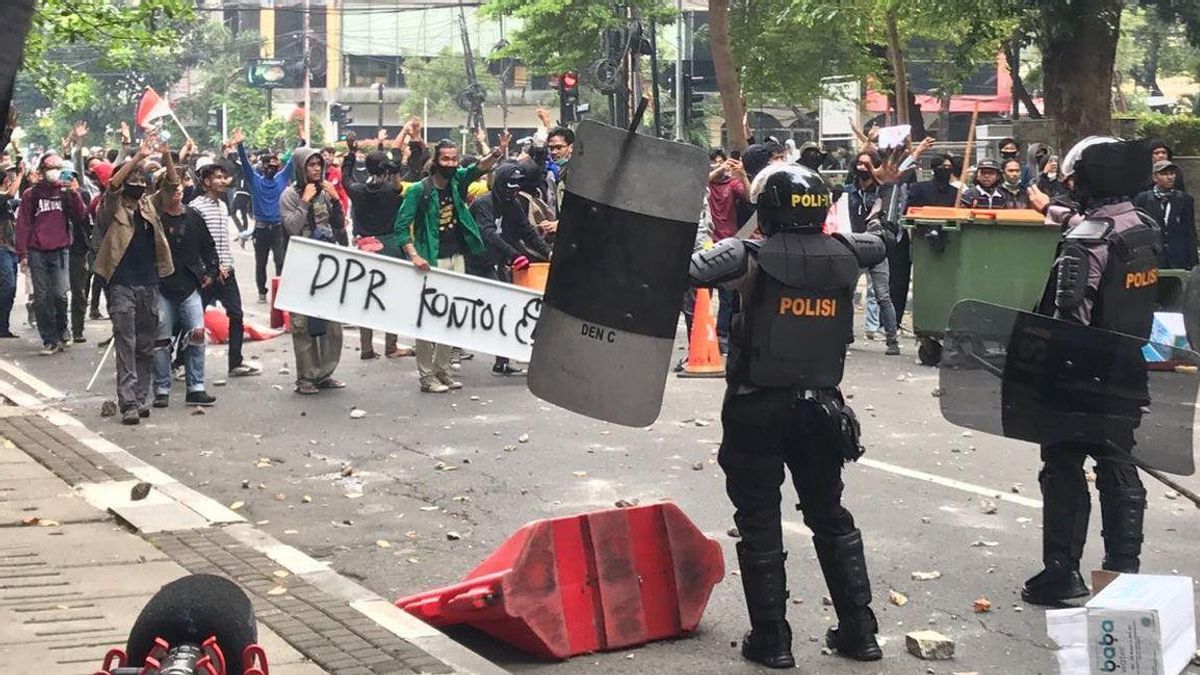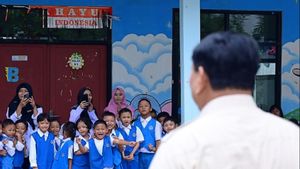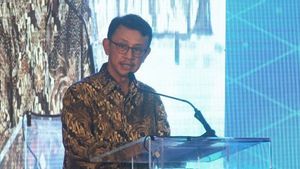JAKARTA - There are many downsides to being a critical student nowadays. Criticism is well ignored. Protests repressive law enforcement. Creating a social media campaign was called by the chancellor. UI students feel the message.
Since President Joko Widodo (Jokowi) was elected president, hopes for the consolidation of democracy after the Reformation have been high. The amount of support that was given won him victory over Prabowo Subianto, a New Order general who is considered responsible for kidnapping activists.
But what happened after the first five years of Jokowi's rule? As the Jakarta Legal Aid Institute (LBH) noted in its 2019 End of Year Notes, Jokowi's leadership was highlighted because "what is said is not what is done."
According to LBH Jakarta, Jokowi's campaign promises are easily forgotten. "Democracy is being carried backwards, the return of authoritarian regimes is a real threat."
The signs are clear. LBH Jakarta stated that the spaces for civil liberties are gradually closing. Freedom of expression, thought, opinion, and organization is threatened.
For example, when the actions of students and students were repressed by the police. "Arbitrary arrests, torture, and being hunted down like criminals."

One of the most brutal repressive actions of the apparatus can be seen in the action against the Draft Criminal Code (RKUHP) and the revision of the Corruption Eradication Commission Law (UU KPK). In that action, at least more than 230 people became victims of the action organized by the alliance of students and civil society.
The action took place in various areas, from Jakarta, Bandung, South Sumatra to South Sulawesi. The repressive action of the apparatus did not happen once. A similar incident also occurred when students and the public asked for the Job Creation Law.
Not long ago, during the commemoration of International Labor Day or May Day, a number of protest participants including students who expressed their aspirations regarding the increase in labor wages, holiday allowances (THR), and the repeal of the Job Creation Law/Omnibus Law were repressed by the authorities. The Commission for Disappeared Persons and Victims of Violence (KontraS) said the police in charge of the mass action carried out a strange policy.
They questioned why the only people allowed to take part in the action were workers. "Students and residents in solidarity were repressed and transported from the point of action," KontraS wrote from its twitter account.
Unstoppable criticismHowever, the repressive attitude of law enforcement officials could not stop the student movement to oversee the running of the government. Closed on the streets, they turn to the virtual world.
Yesterday, the post of the University of Indonesia Student Executive Board (BEM UI) that proclaimed President Joko Widodo (Jokowi) as 'The King of Lip Service' went viral. BEM UI's criticism has become a topic of discussion for various parties.
BEM UI's upload on his Twitter account is not without reason. According to them, the statements made by Jokowi are always different from the reality on the ground.
"Jokowi often sells out his sweet promises, but the reality is often inconsistent. He says this, the facts are like that. Starting from longing for demonstrations, revising the ITE Law, strengthening the KPK, and a series of other promises," wrote the @BEMUI_Official account.
JOKOWI: THE KING OF LIP SERVICE pic.twitter.com/EVkE1Fp7vz
— BEM UI (@BEMUI_Official) June 26, 2021
The post was retweeted more than 23,000 times and was rewarded with more than 45,000 likes. This crowd also invited various comments from many parties. Starting from activists, political figures, and academics.
As a result of this upload, several members of BEM UI were called by the chancellor. They are required to meet the head of the university on Sundays when the campus is closed. This suddenly makes the polemic getting bigger.
Shit twiceThe bad luck of these critical students did not stop there. BEM UI's upload received scathing comments from a senior UI lecturer, Ade Armando.
Ade said that if you become an institution that represents UI students, don't look stupid or stupid. And the expression that became controversial was when he said "I used to enter UI, did you bribe?"
Ade's words about this bribery immediately invited comments. The Executive Director of the Southeast Asia Freedom of Expression Network (SAFEnet), Damar Juniarto, for example.
He said that there was nothing to be proud of from a senior UI lecturer who said "he used to bribe UI", "shallow" and violated the rules just because BEM UI criticized Jokowi as the king of lip service. "The statement is a splatter on itself," Damar wrote via his Twitter account.
There is nothing to be proud of from the rector and senior lecturer of UI who said "I used to go to UI for bribes", "shallow" and violated the rules just because BEM UI criticized Jokowi, The King of Lip Service.
— txt from DAM (@DamarJuniarto) June 28, 2021
Ade Armando's attitude is also said to not reflect his ideal role as an academic. As a university lecturer, Ade Armando should understand the role of students in the political system. Criticism from students should be fostered as a supplement to democracy.
"Student criticism must be considered as a normal ingredient in our current political system. It is a supplement to today's reform political life," said member of the Indonesian Caucus for Academic Freedom (KIKA), Robertus Robet to VOI, Monday, June 28.
We interviewed one of the 2006 FISIP UI alumni whom Ade Armando had taught. Let's say her name is Rose. In line with Damar, Mawar feels that Ade's statement about "entering UI for bribes" is actually demeaning the name of the yellow campus itself.
"I think it's stupid, maybe he just intends to attack BEM UI, but instead humiliates the campus, where he teaches and grows up," said Mawar to VOI.
Mawar said, Ade's tweets, which mostly attacked BEM UI members personally, showed his powerlessness. "It looks really helpless with the data displayed by BEM UI. Instead of responding to arguments about the content presented, both of them focus on attacking personal targets."
Mawar was surprised by Ade's controversial statement. Because in the past Ade was one of the lecturers who had a fun way of teaching. "Not the 'old-fashioned' type of lecturer. But it's not special, in my opinion, not memorable."
In addition, Ade Armando also used to be a figure known to be easy to talk to and not rigid. "Maybe it's because he was young at the time," said Mawar.
Student role
According to Robertus Robet, the polemic of summoning students by UI rector is not a good sign. In fact, according to him, during the New Order era, which was known to be authoritarian, "my rector kept his distance enough not to impose sanctions and all kinds on students who criticized the government," he said.
Robertus said that because the rector is part of the academic community, he is bound by one academic ethics and culture. "So the approach is not power. So as much as possible the approach is academic."
According to Robertus, the student's name cannot be separated from political attitudes because they are political subjects. When looking at history, "the character of these students was formed as part of political history, in Indonesia and many other places."
For example, since 1965, when the emergence of the New Order, it has brought students as a political subject. "Students cannot be separated from political attitudes because from the beginning they were political subjects. For example, from 65, the emergence of the New Order state brought students as a political subject. 74, 78, 98
*Read other information about BEM UI or other interesting articles from Ramdan Febrian Arifin.
Other BERNASThe English, Chinese, Japanese, Arabic, and French versions are automatically generated by the AI. So there may still be inaccuracies in translating, please always see Indonesian as our main language. (system supported by DigitalSiber.id)









